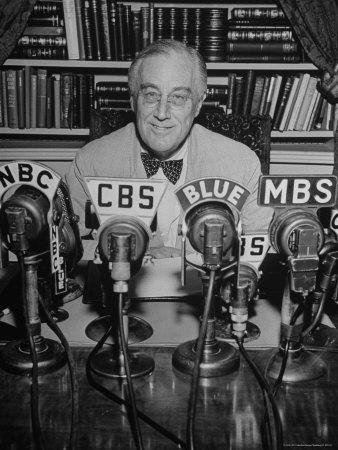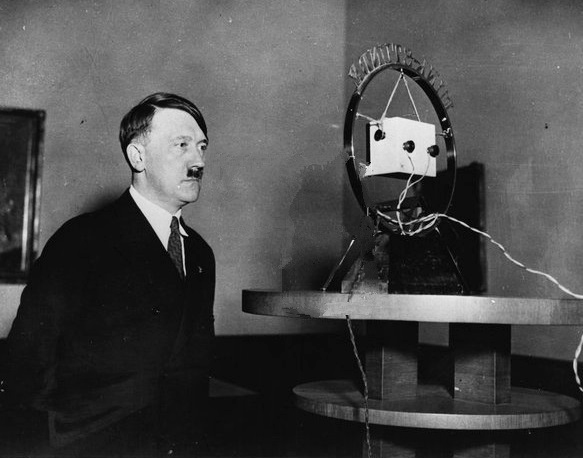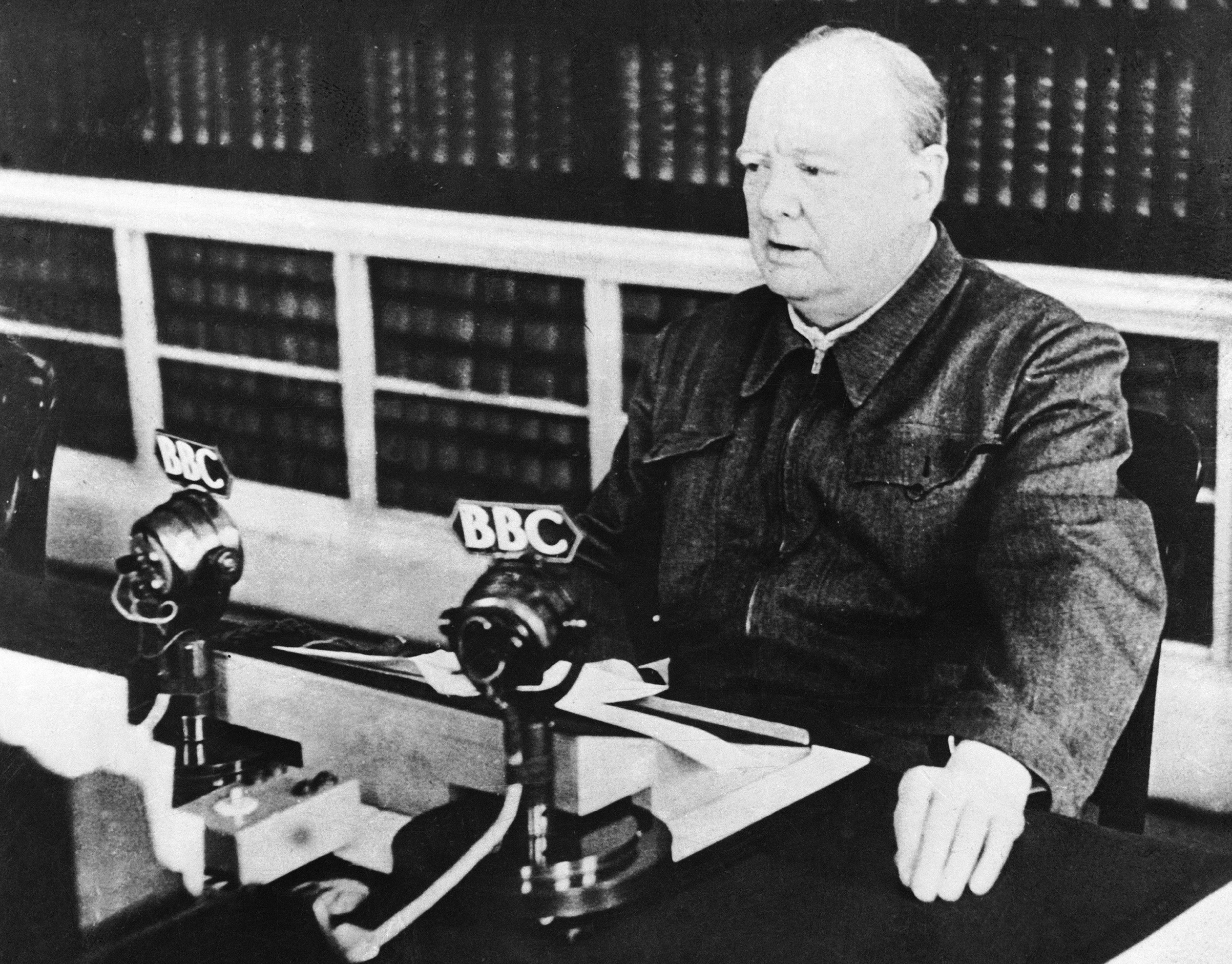During World War II, broadcasting was crucial, serving as a powerful tool for morale-boosting, propaganda, and communication among the participating nations. Before television became widely accessible, governments and leaders in this era used radio to broadcast information, influence public opinion, and rally their populations to face the difficulties of international conflict. The use of broadcasting during World War II demonstrated the significant impact of the radio on society, politics, and the conduct of war. This included motivational speeches, wartime news updates, propaganda efforts, and entertainment broadcasts. During World War II, broadcasting played a significant role in the United States, serving both informational and propagandistic purposes.

During the war, the American public's main source of news and information was radio. Regular newscasts gave information on the war's progress, governmental regulations, rationing, and other crucial issues. People listened to the radio to remain up to date on current events. Radio was a propaganda instrument utilized by the U.S. government to raise spirits, foster patriotism, and rally support for the war effort. War-related themes and messages were included into shows like "The War of the Worlds" and "Fibber McGee and Molly" throughout their broadcasts. To express pro-American and anti-enemy emotions, the Office of War Information also created a variety of radio programs and advertising.
The sale of war bonds was greatly assisted by radio. In order to persuade people to purchase bonds to fund the war effort, celebrities and well-known individuals participated in radio broadcasts and rallies. Information on civil defense plans, blackout exercises, and other safety measures was also broadcast over radio. These broadcasts aided in preparing the populace for possible assaults and calamities.

During World War II, Germany, which was ruled by the Nazi party, utilized radio as a propaganda weapon to further its wartime goals, shape public opinion, and propagate the Nazi ideology. The Nazi Minister of Propaganda, Joseph Goebbels, had complete control over the media, including radio. Nazi propaganda was firmly ingrained in radio broadcasts, which presented a carefully edited version of events and promoted the regime's worldview. The objective was to sway public opinion, keep the war going, and foster Hitler-loyalty. Germany also disseminated propaganda in a variety of languages to sway citizens of neighboring nations and conquered regions.
These broadcasts were meant to promote cooperation with the Nazi regime, and spread false information. The distribution of news was strictly regulated by the German government. News stories were frequently skewed and altered in radio broadcasts to depict German wins as inevitable and Allied losses as disastrous. This skewed depiction of reality served to boost German public morale. Nazi broadcasts spread anti-Semitic and hateful material. Anti-Semitic attitudes in Germany and the occupied territories grew as a result of the demonization of Jews and other minorities. The speeches of Adolf Hitler were often broadcast, typically with the intention of uniting the German people and defending military operations.
To guarantee that they broadcast only Nazi-approved material, local radio stations were frequently taken over or severely restricted. Hitler utilized his persuasive speaking abilities to keep up support for the war effort. In conclusion, Germany's use of radio during World War II was an effective means of spreading propaganda, stifling information, and influencing public opinion both within Germany and in the conquered areas. It was essential to achieving the goals of the Nazi dictatorship and retaining backing for its wartime operations.
During his reign as the head of Nazi Germany, Adolf Hitler was successful in inspiring many Germans for a variety of reasons, but it's crucial to underline that his motives and strategies were incredibly polarizing and had disastrous results.
Hitler was a very compelling and powerful speaker. Many Germans found his impassioned, moving remarks to be compelling. His speeches frequently blended appeals to national pride, feelings of injustice, and a vision of a resurgent Germany, which gave his supporters a sense of direction and cohesion. Following the horrors of the Great Depression, the Nazi dictatorship pursued programs that seemed to strengthen the German economy. Under Hitler's direction, public works initiatives, and the decline in unemployment contributed to the image of progress.
After the severe conditions of the Treaty of Versailles that ended World War I, Hitler tapped into a sense of wounded national pride and animosity. Many people who believed their nation had been humiliated and treated unfairly responded favorably to his vow to bring back Germany's greatness.
Hitler's dictatorship used repression, intimidation, and terror to stifle dissent. It was easier to preserve harmony and conformity when there was an atmosphere of fear and political competitors were eliminated. The dictatorship painted a narrative of military triumph and an expanding empire through distorted statistics and controlled media, even though the truth was frequently different. Many Germans felt more optimistic as a result of this sense of victory.
Within Nazi propaganda, Hitler was given a position that was almost divine. He was depicted as Germany's rescuer, and his picture could be found everywhere. This strengthened people's allegiance and love to him. It's important to remember that while Hitler's ability to inspire people was successful in uniting many Germans behind him, it was also exploited for incredibly devastating ends. His leadership caused the Holocaust, millions of people to die in World War II, and untold numbers of others to suffer. His dictatorship was based on severely wrong motivations, and its tactics included brutality, deceit, and propaganda. His leadership's effects continue to serve as a sobering caution about the perils of charismatic but destructive leaders.
The United Kingdom utilized broadcasting as a vital medium for communication, information distribution, and morale-boosting during World War II. Regular radio updates on the war's evolution, military operations, and other key events were supplied. The British Broadcasting Corporation (BBC) was crucial in providing the British population with dependable and accurate news. The public was made aware of crucial wartime measures including air raid preparations, blackout protocols, and rationing through the BBC and other media channels. The purpose of these broadcasts was to guarantee the public's safety and compliance.
Radio programs were used by the British government to maintain and raise public morale. Programs like "War Report" and "Britain Speaks" told individual tales of bravery and resiliency, fostering a sense of community and resolve among the populace. Winston Churchill, one of the most prominent political figures, utilized radio to address the country and reassure citizens during times of crisis. Churchill was noted for his powerful language and inspirational style in talks, which is best demonstrated by his well-known "We shall fight on the beaches" speech.
Despite the difficulties of war, British life continued to depend heavily on entertainment. In order to give a respite from the horrors of war, radio broadcasts featured comedy programs, music, and drama. These shows also promoted war effort support and incorporated some propaganda messages. British broadcasts did not just target the UK. They also had other countries throughout the world and occupied Europe in mind. People in Axis-occupied countries received news, information, and inspirational messages via the BBC World Service, which aided resistance activities.
British intelligence services kept an eye on enemy radio transmissions, which helped them gather crucial knowledge on the goals and spirit of the Axis. This information was utilized strategically and to discredit the propaganda of the adversary. To connect with neutral nations and possible allies, radio broadcasts were employed. The British government sought to mobilize support for the war effort abroad and shift public opinion in favor of the Allied cause.
Overall, broadcasting during WWII served a variety of purposes, such as spreading information, propaganda, increasing morale, and diplomacy. Radio broadcasting was essential to the strategies of both the Allies and Axis sides of the war. The technological advancement set the stage for the deadliest conflict in human history.
Works Cited/References
Hilmes, M. (2021). Only Connect A Cultural History of Broadcasting in the United States. Boston, MA, Cengage.
https://www.scienceandmediamuseum.org.uk/objects-and-stories/tv-radio-second-world-war



Comments
Post a Comment